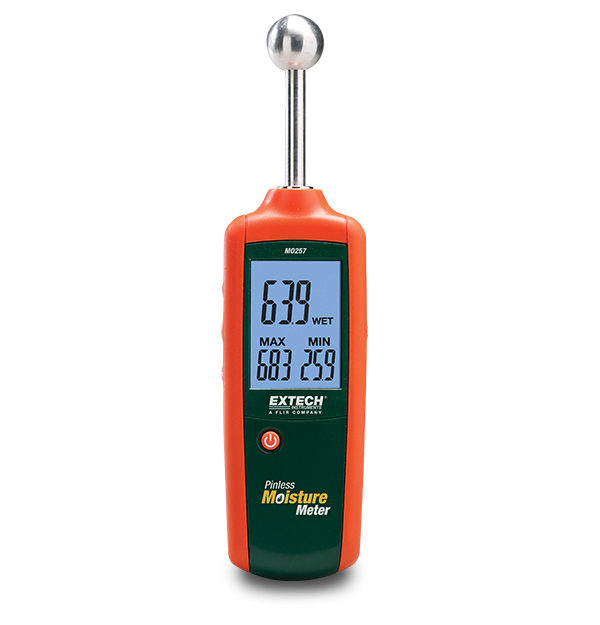Recognizing the Various Sorts Of Moisture Meters and Their Applications
Wiki Article
The Ultimate Guide to Dampness Meters: A Comprehensive Introduction and How They Can Conserve You Cash
Wetness meters offer as important devices in discovering and monitoring moisture material in products, aiding in avoiding pricey problems and ensuring the high quality of items. Understanding the nuances of different kinds of dampness meters, their applications, and the possible cost-saving benefits they provide can be a game-changer for businesses and specialists alike.Types of Wetness Meters
One typical type is the pin-type wetness meter, which determines the electric resistance in between 2 pins put into a product. Pinless moisture meters, on the other hand, usage electro-magnetic sensor plates to scan a bigger location without causing damage to the material's surface.
Infrared dampness meters determine the thermal residential or commercial properties of a product to determine its wetness web content non-invasively, making them useful for applications where pin or pinless meters may not be ideal. Understanding the different kinds of dampness meters available can assist sectors choose the most suitable device for their details wetness dimension demands.

Benefits of Utilizing Dampness Meters
Dampness meters offer vital benefits in precisely keeping an eye on and analyzing moisture levels in diverse products and settings (Moisture Meter). Among the primary benefits of utilizing wetness meters is the avoidance of possible damage triggered by excess wetness. By finding and dealing with high wetness degrees early on, moisture meters assist to avoid mold and mildew development, rot, and structural damage in buildings, saving both time and money on repair work. Furthermore, wetness meters help in making sure the top quality of products during building and construction or production processes. By properly gauging moisture content, these tools help maintain the integrity of wood, drywall, concrete, and other materials, decreasing the risk of problems or failures.
Furthermore, utilizing dampness meters can lead to increased power performance. In agricultural setups, dampness meters play a vital role in maximizing plant yields by making it possible for farmers to monitor dirt moisture degrees and make informed watering choices.
Exactly How to Choose the Right Wetness Meter
When picking a dampness meter, it's crucial to make certain that the meter is appropriate for the particular material you will be screening. Various products have varying electric buildings that can impact wetness readings, so selecting a meter designed for your product is vital for accurate outcomes. By thoroughly evaluating these variables, you can choose a dampness meter that satisfies your requirements and gives precise dampness measurements for your tasks.Appropriate Strategies for Wetness Meter Use

Cost Savings Via Dampness Meter Applications
Just how can the critical application of dampness meters cause considerable expense savings throughout numerous markets? Wetness meters play a critical duty in expense savings by preventing possible damages and making sure quality assurance in different industries. In the agriculture market, dampness meters help in figuring out the ideal time for gathering plants, protecting against excess or over-drying moisture that can affect Bonuses the final product's quality. This specific surveillance helps farmers avoid unnecessary losses and optimize their yield.
In a similar way, in building and construction, wetness meters help protect against pricey damages by finding wetness levels in building products, such as timber or concrete, which can result in architectural problems if not resolved without delay. By determining trouble areas early on, specialists can take corrective procedures to avoid substantial repairs or replacements, eventually saving time and cash.
In addition, in the food handling industry, wetness meters are crucial for keeping track of product high quality and making certain conformity with safety policies. By precisely determining dampness web content in food, manufacturers can avoid putridity, preserve quality, and minimize waste, causing substantial price financial savings. On the whole, the critical application of moisture meters is an important investment that can result in considerable cost reductions and improved efficiency across different markets.
Final Thought
In conclusion, wetness meters are important devices for determining and spotting dampness levels in numerous materials. By making use of the ideal wetness meter and adhering to correct methods, users can successfully avoid pricey problems caused by excess dampness.Dampness meters offer as important devices in discovering and monitoring moisture material in products, aiding in stopping pricey damages and making sure the top quality of products. Infrared wetness meters gauge the thermal homes of a product to determine its wetness web content non-invasively, making them useful for applications where pin or pinless meters may not be suitable.Wetness meters supply indispensable benefits in properly assessing and keeping an eye on wetness degrees in diverse materials and atmospheres. In agricultural settings, wetness meters play a crucial duty in maximizing crop yields by making it possible for farmers to keep track of dirt dampness degrees and make educated watering choices.In verdict, dampness meters are valuable tools for spotting and determining wetness levels in different materials.
Report this wiki page